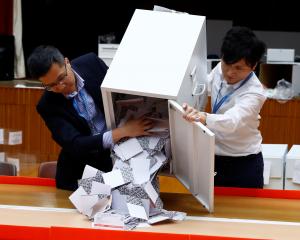According to the police, a number of witnesses were spoken to after Green Party co-leader Russel Norman complained of assault by Chinese security agents attending the visit to Parliament by China's Vice-president, Xi Jiping, last week.
Presumably, these included members of the force stationed at Parliament Buildings.
Police also studied film footage and photographs of the incident, and had sought, to no avail, to speak to the Chinese alleged to be involved.
It was concluded - quite swiftly in the circumstances - there was insufficient evidence to substantiate a prosecution.
This should be no surprise.
The prospect of the police mounting a sufficiently strong case was weakened as soon as it became clear that Dr Norman had apparently moved from his initial location at the foot of the steps to Parliament's main building to the entrance of the Beehive to be very much closer to the point at which the vice-president passed, thus himself contributing to a degree to the predictable response by Chinese security guards charged with protecting their leader.
That response, to judge from televised footage, involved some jostling of Dr Norman and the Tibetan flag he was holding being thrown to the ground.
It was an unwarranted response, but understandable.
The incident has once again raised quite valid questions about the right of "free speech" in this country, and not for the first time it has arisen from an incident involving visits from Chinese officials.
Their extreme sensitivity to supporters of the Chinese "occupation" of Tibet, or to the Falun Gong movement, has usually triggered a reaction many New Zealanders find distasteful.
Certainly, such situations place the New Zealand police in an unenviable position.
Is their job to protect protesters from hostility by visiting Chinese security guards, or is it to protect VIPs from protest action? The warming relations between New Zealand and China have seen Chinese VIPs visiting virtually every year of the past decade, and too often in the past our police have been unreasonably protective of the visitors, most notoriously on the occasion of the visit to Christchurch in 1999 when Chinese President Jiang Zemin kept 350 guests waiting for nearly two hours because of the proximity of pro-Tibetan protesters, whom police eventually kept out of his sight and hearing.
Admittedly, the police are in some difficulty, since international convention, to which this country is a signatory, requires a host nation to protect not only the security but also the dignity of visitors - a point entirely lost on local protesters.
In the past, the Green Party's MPs have directly objected to official Chinese visitors, so Dr Norman's protest was by no means unexpected.
His predecessor, the late Rod Donald, held up a Tibetan flag on the steps of Parliament during a visit of the chairman of the Chinese National People's Congress, Wu Bangguo.
The following year, three Green MPs - Jeanette Fitzsimons, Sue Kedgley and Keith Locke - stood holding a large Tibetan flag between them beside another VIP's car when he arrived at Parliament, before heading off to join the official dinner.
Like them, Dr Norman used his privileged position as an MP to be present on Parliament's forecourt.
That he then rushed forward towards the vice-president resulted in a predictable response.
The only surprise is that our local police did not stop him before the Chinese tried.
This is assumed to be the reason why Prime Minister John Key felt obliged to apologise to the Chinese delegation, since the failure to provide adequate security is a serious matter.
Dr Norman has complained about his treatment to the Speaker, who is responsible for Parliament and its grounds, and Mr Key has asked for security arrangements to be revised.
Dr Norman may consider himself fortunate, in the circumstances; had he tried his stunt in many other Western democracies he might well have stopped a bullet.
The fact remains that he was allowed to have his protest - his "free speech" action was not suppressed and could be heard loud and clear, although it must be considered a certainty the Chinese security guards had not the faintest notion who he was.
Successive New Zealand governments have in the past decade or more routinely expressed concern - on behalf of Dr Norman and other protesters - to Chinese visitors about the infringements of human rights in China, while successfully maintaining a relationship that has resulted in China becoming our second largest trading partner.
That relationship is hardly to be jeopardised on the strength of one MP's needless behaviour.











